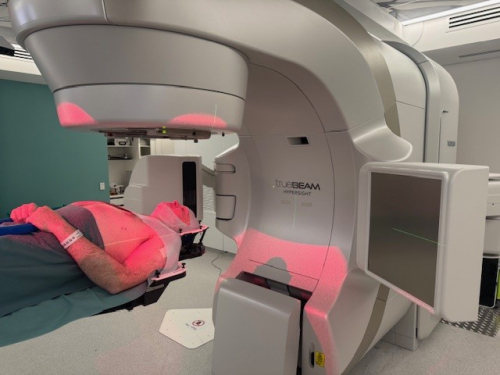Lifesaving trial moves to Tasmania

Before COVID-19 struck, Natalia Rodriguez had been travelling from Launceston to The Alfred Oncology Unit every three weeks to take part in a clinical trial that could save her life.
The mum of two has cervical cancer, and the phase 1 trial of two immunotherapy drugs, which are still undergoing early testing, had already shown promise in shrinking the tumours that had spread throughout her body.
But with the outbreak of COVID-19 in Australia, Tasmania shut its borders. Natalia was no longer able to travel to Melbourne to continue the treatment – the only treatment that had made any headway against her cancer.
Fully realising the urgency, Natalia’s team at The Alfred has been able to overcome considerable hurdles for her to continue the treatment safely in Tasmania. They did this by setting up a satellite hub for the trial at The Royal Hobart Hospital through an innovative practice call ‘Teletrials’. This was the first time in Australia, and probably the world, that the Teletrials model is being used for a phase 1 clinical trial.
Trial treatments can only be given at approved sites and this trial was not available in Tasmania. However, working with the pharmaceutical company involved, state governments and regulatory bodies, Medical Oncologist Dr Mark Voskoboynik and his team at The Alfred have made it possible to continue Natalia’s treatment on the trial in Tasmania.
“We wanted to do everything we could to help Natalia continue on the trial, as the treatment is working. However, nobody had previously worked out how to treat someone on a phase 1 trial using intravenous therapy outside of a main approved site – there are so many obstacles. So we reached out to the global medical lead to see if we could run a Teletrials phase 1 trial from Hobart, and we worked it out,” Dr Voskoboynik said.
“It’s been a phenomenal effort by everyone involved, and I want to acknowledge our amazing nurses and staff in Alfred Cancer Trials, the team at Cancer Trials Australia, the Alfred Ethics & Research Governance Office and the numerous hospital and Tasmanian Government officials involved. That we achieved this in only a matter of weeks is a testament to their dedication.”
Natalia has immense gratitude for the team who have gone above and beyond to ensure she can continue her treatment.
“It’s been a huge process to get this happening and it wasn’t with any certainty,” Natalia said.
“That they’ve been able to make it happen, I’m so grateful.”
The Alfred’s Director of Oncology, Professor Mark Shackleton, said it was wonderful to see a positive come out of the COVID-19 pandemic.
“This is a real innovation created from the urgent situation Natalia was faced with,” Prof Mark Shackleton said.
“We will definitely continue to expand trials in this way, providing better access to cutting edge treatments for patients who can’t travel to main trial sites like our Unit at The Alfred.
“Of course, these programmes require specific resources, and the support we received recently from the Federal Government for the TrialHub initiative will be a major boost. But continued buy-in from all partners – industry, governments, communities – will be essential,” said Prof Shackleton.
“Clinical trials offer hope to patients when there are no other conventional treatment available. More than this, they are the only paths to better outcomes, improved quality of life, and even cures from major diseases like cancer. The more we can give people access to them, the better – and we won’t let COVID-19 stop us.”
Allison Black, Medical Oncologist Royal Hobart Hospital, said supporting all Tasmanian oncology patients is a priority for the staff at the Royal Hobart Hospital.
“I would like to thank the Tasmania Health Department, Royal Hobart Hospital Clinical Trials Unit and Legal service for making Natalia’s ongoing care a priority during the COVID pandemic. It is an honour to be involved with such a positive collaborative process between the two hospitals,” she said.


